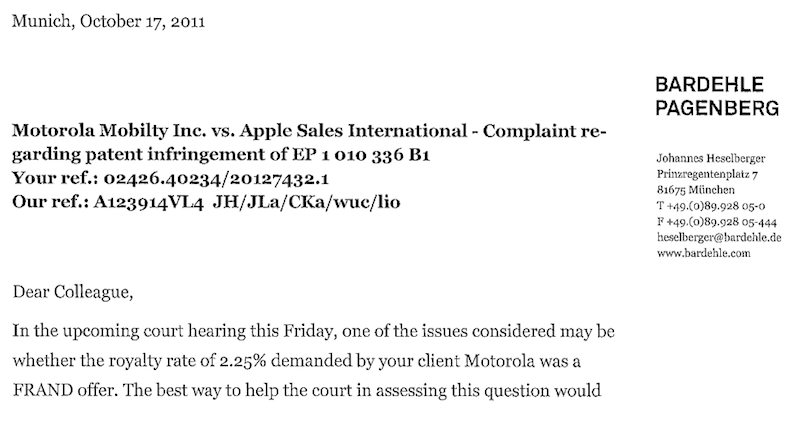DoJ allows Google acquisition of Motorola, but calls FRAND commitments 'ambiguous'
In a statement on Monday, the Justice Department said they concluded the investigation because Google is "unlikely to materially alter" Motorola's "long and aggressive history" of leveraging its intellectual property against its rivals. As such, a transfer of ownership rights from Motorola to Google would not represent a significant change in the competitive landscape.
Google announced last August that it had reached an agreement with Motorola Mobility to acquire the company for $12.5 billion. CEO Larry Page indicated that legal pressure from Apple and Microsoft had forced the company to protect itself by merging with Motorola.
The agency's announcement comes on the heels of regulatory approval of the Google/Motorola deal in the European Union. The European Commission is allowing the merger to go ahead, but it warned that it will keep a close watch on patent litigation due to concerns that Google "can abuse" Motorola's patents by linking them with its Android devices. The DoJ said in its statement that it had "cooperated closely" with the European Commission in its investigation of the deal.
According to the investigation, Google's commitments to FRAND licensing have been "less clear" than Apple and Microsoft's vocal commitments (1, 2) to not threaten competitors with injunctions for standard-essential patents (SEPs). The DoJ notes Google as having stated that it will refrain from pursuing injunctive relief over infringement of SEPs only for disputes involving future license revenues and only if the counterpart agrees not to challenge the validity of the patent, pays the full disputed amount into escrow and agrees to a reciprocal process regarding injunctions.
"Google’s statement therefore does not directly provide the same assurance as [Apple's and Microsoft's] statements concerning the exercise of its newly acquired patent rights," the statement read.
The agency went on to note that it will allow Google's acquisition of Motorola's patents, but it still has concerns about what Google will do with those patents once the deal is completed. It pledged to "continue to monitor" the use of SEPs in the wireless device industry, especially for smartphones and tablets.
Motorola has had some initial success in Europe with wielding its SEPs against Apple. The company won two out of three injunctions for its essential patents in a German court in recent months.
Apple, however, has fought back with an "antisuit lawsuit" against Motorola. The Cupertino, Calif., company alleges that Motorola's German lawsuit is in "direct breach" of a patent licensing agreement with Qualcomm that extends to Apple.
Motorola apparently sent a letter to Qualcomm last year terminating "any and all license and covenant rights with respect to Apple." Qualcomm responded by claiming that Motorola was not entitled to revoke its rights because of Apple's own lawsuits.
Samsung attempted the same maneuver with its FRAND-encumbered patents last year in France, but the court ultimately decided that FRAND declarations required irrevocable licenses to be granted.
Motorola has also come under fire after it was revealed that the company is seeking 2.25 percent of Apple's sales for a patent license. Apple has submitted motions to see Motorola's contracts with other handset vendors to determine whether the 2.25 percent is fair. The requested royalty rate has been characterized as exorbitant by some because handset profits would be quickly eroded if other companies that hold patents for standards demanded similar rates.
Credit: Foss Patents
Monday's announcement also included the news that the Justice Department had closed its investigation into the acquisition of Nortel's patents by a consortium, which includes Apple, Microsoft, Research in Motion and others. Apple's purchase of patents originally owned by Novell was also given the green light by the agency.
 Josh Ong
Josh Ong











 Mike Wuerthele
Mike Wuerthele
 Malcolm Owen
Malcolm Owen
 Chip Loder
Chip Loder

 William Gallagher
William Gallagher
 Christine McKee
Christine McKee
 Michael Stroup
Michael Stroup
 William Gallagher and Mike Wuerthele
William Gallagher and Mike Wuerthele






